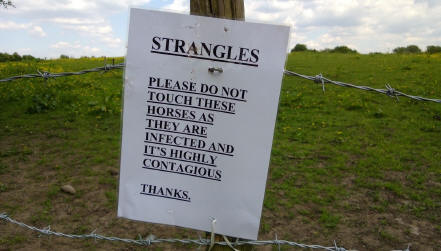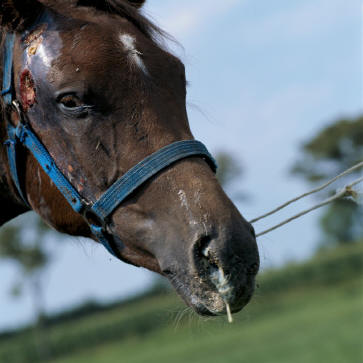Reportable diseases
Dr. Kimberly Brokaw, DVM
Walkersville Vet Clinic
 (5/2) Contagious diseases are a source of panic for many people. My grandparents remember the days of polio. My mother remembers seeing children with often-fatal strains of meningitis that are now prevented by childhood vaccines. Infectious diseases remain a problem for people,
as well as for animals. State governments do their best to help prevent the spread of contagious diseases. Certain contagious diseases are reportable in the state of Maryland.
(5/2) Contagious diseases are a source of panic for many people. My grandparents remember the days of polio. My mother remembers seeing children with often-fatal strains of meningitis that are now prevented by childhood vaccines. Infectious diseases remain a problem for people,
as well as for animals. State governments do their best to help prevent the spread of contagious diseases. Certain contagious diseases are reportable in the state of Maryland.
Veterinarians must report any of the listed diseases to the state veterinarian within 48 hours of their first knowledge of the disease. While all states have lists of diseases that are reportable, the lists are not the same for each state. Reporting certain diseases, such as rabies, which is contagious and has human and animal health risk, makes sense.
Other reportable diseases such as Equine Protozoal Myeloencephalitis (EPM) and Potomac Horse Fever have less obvious reasons for being reportable. Those diseases are not directly communicable and do not have a direct human health risk. Equine Strangles, however, is not reportable in the state of Maryland, despite being extremely contagious.
 When a veterinarian is suspicious of a reportable disease, the veterinarian is required by law to notify the state, even if the owner of the horse wishes to keep the disease completely hidden. Some owners do not want the stigma of having their barn quarantined,
whereas other owners are hesitant to have government officials involved in anything.
When a veterinarian is suspicious of a reportable disease, the veterinarian is required by law to notify the state, even if the owner of the horse wishes to keep the disease completely hidden. Some owners do not want the stigma of having their barn quarantined,
whereas other owners are hesitant to have government officials involved in anything.
Sometimes vets can be met with hostility by the owner when they are simply trying to do their job and follow state law. I have had to explain to several clients that I am required to report certain diseases to the state and risk fines as well as losing my veterinary license if I don't comply. While they may still be angry at the situation, usually I
can redirect their anger away from myself and towards the government.
I was recently called out to a farm to examine a horse. The owner told me that "Wobbles" had been lame for a week and now was colicing. Prior to this episode Wobbles had been a healthy horse and had only been seen by the vet about once per year over the last few years for routine coggins testing and his rabies vaccine. When I arrived at the farm, I
noted that the horse was not lame or colicing but was in fact displaying signs consistent with neurologic disease.
Wobbles was unsteady on his feet, had muscle tremors and fasciculations/twitches on his entire body. He was also hypersensitive to touch, moving abruptly away from me when I gently stroked him with my fingertip. I was happy that Wobbles was up to date on rabies vaccine, and that his history was not consistent with rabies. Equine neurologic diseases are
reportable in the state of Maryland. I explained to the owner that I was going to have to collect blood and nasal swab samples to submit to the state lab and notify the state veterinarian.
The owner was immediately upset by my discussion of sending samples to the state laboratory. He told me that he was willing to pay extra money if I could just send the tests to a different lab and not involve the government. He told me that Animal Control had been called multiple times on him and he didn't want any government officials snooping around
his farm. All of the animals at the farm with Wobbles were healthy. None of them were thin and you could tell that they had been receiving regular hoof care.
While there was adequate shelter and hay, there was no grass in the field. I could quickly see why passer-bys who did not understand animal nutrition might call Animal Control and why Animal Control would investigate and find the care of the animals acceptable. Despite the fact that Animal Control always determined that Wobbles' owner was taking good
care of the animals, he did not want to have government officials on his farm.
After explaining to Wobbles' owner that I had no choice but to report his horse's condition to the state vet, I also told him that in the cases I had reported in the past, no one from the state actually came to the farm. Past cases had been managed with a phone conversation and they were happy to test samples that I provided and did not need an
official to inspect the premises or the horse. I also told him that if he did not let me take blood samples and nasal swabs from his horse, I was still required to notify the state veterinarian and then they would come to his farm to collect samples.
Wobbles' owner seemed satisfied with that answer and consented to have me pull the samples. I told the owner that the state would test Wobbles for equine herpes virus for free but that the diseases I was most suspicious of (Encephalitis causing viruses or EPM) would likely not be free tests. As Wobbles wasn't seen until a Friday afternoon, the test
results would take a little time to get back. Treatment for encephalitis was started immediately while the tests were pending.
The state lab ran the test for equine herpes virus which came back negative. That meant the farm was not placed under quarantine and no state officials came to the farm. Wobbles continued to improve with the medication, and recovered. His owner was greatly relieved that Wobbles recovered, and that he did not have to involve the government in the care
of his animals.
Contagious disease causes a lot of anxieties for owners and veterinarians. Vaccines and good animal care prevent many, but not all, contagious diseases. When government involvement is necessary, there are no alternative to that involvement. The threat of government involvement can sometimes lead people to make bad choices for the health of their
animals. Luckily in this case, Wobbles was tested and treated appropriately.
Read other articles by Dr. Kim Brokaw